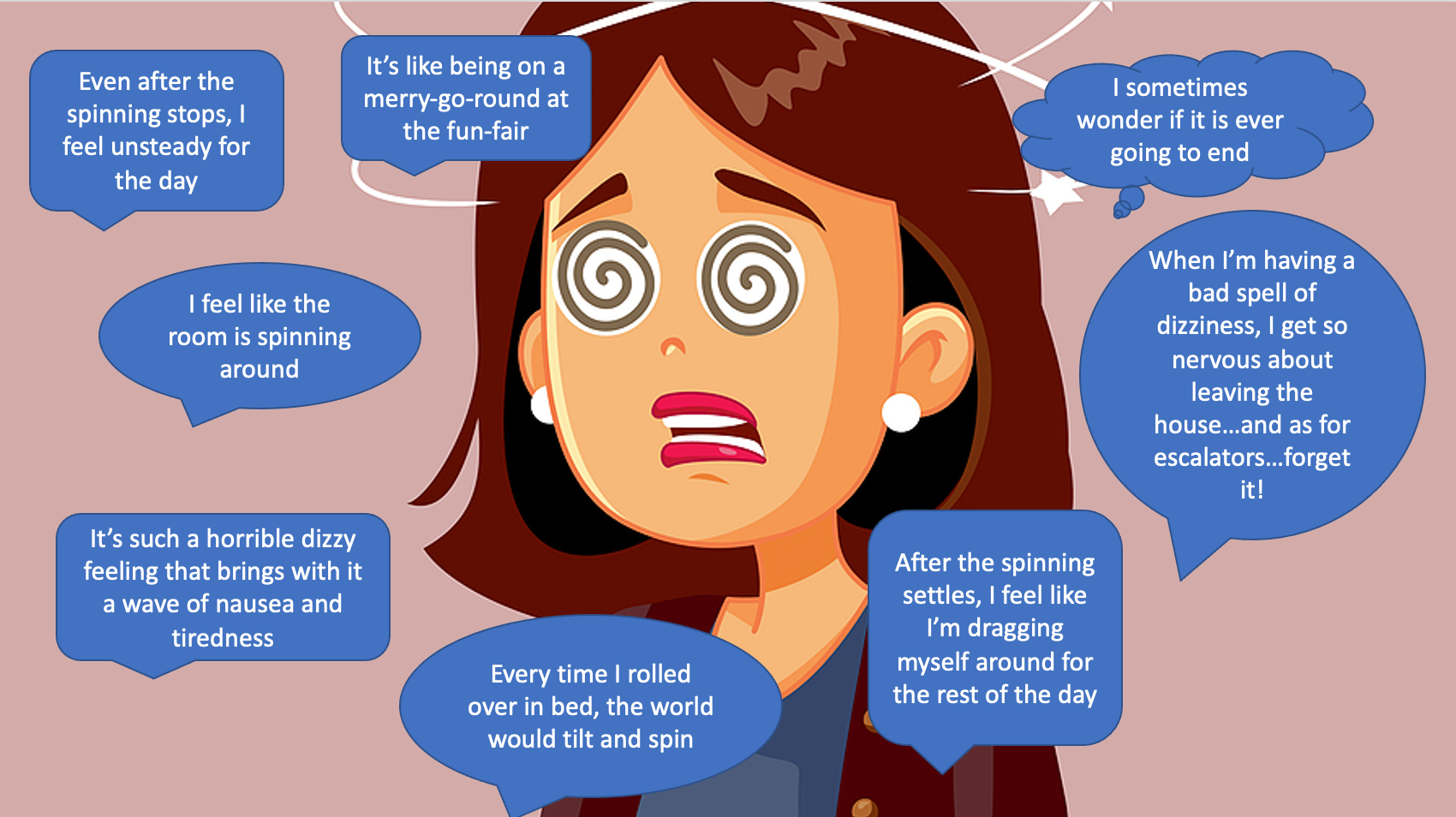Early signs of vertigo – Vertigo, characterized by a sensation of spinning or dizziness, can be a disconcerting experience. Understanding its early signs is crucial for seeking timely medical attention and managing its impact. This article delves into the telltale symptoms of vertigo, their causes, and effective strategies for prevention and management.
Early Symptoms of Vertigo

Vertigo, a sensation of spinning or dizziness, can have various underlying causes. Recognizing the early signs of vertigo is crucial for timely diagnosis and appropriate treatment.
The most common early signs of vertigo include:
- A false sense of movement, as if the surroundings are spinning or tilting
- Lightheadedness or dizziness that worsens with sudden head movements
- Nausea and vomiting
- Difficulty balancing and walking
- Blurred vision or double vision
- Ringing or buzzing in the ears (tinnitus)
- Headaches
Sensation of Vertigo
The sensation of vertigo can vary in intensity and duration. It can range from mild dizziness to severe episodes that cause difficulty standing or walking. The spinning or tilting sensation can be constant or intermittent, and it may be accompanied by nausea, vomiting, and other symptoms.
Early signs of vertigo can include dizziness, nausea, and difficulty balancing. If you experience these symptoms, it’s important to see a doctor to rule out any underlying medical conditions. In the meantime, there are some things you can do to help manage your symptoms, such as avoiding sudden movements, staying hydrated, and getting plenty of rest.
Click here for more information on what to do if you have vertigo. Early detection and treatment of vertigo can help to prevent serious complications.
Balance and Coordination
Vertigo can significantly affect balance and coordination. The false sense of movement can make it difficult to walk, drive, or perform everyday activities. Vertigo-related balance problems can increase the risk of falls and injuries.
Causes of Vertigo: Early Signs Of Vertigo
Vertigo, a sensation of dizziness or spinning, can result from various underlying medical conditions. It often arises from disturbances within the inner ear, responsible for maintaining balance. Other contributing factors include certain medications and lifestyle habits.
Role of the Inner Ear
The inner ear houses the vestibular system, a complex network of fluid-filled canals and sensory cells. These structures detect head movements and relay signals to the brain, allowing us to perceive balance and spatial orientation. Dysfunction within the vestibular system, such as inflammation or damage, can disrupt these signals, leading to vertigo.
Medical Conditions
* Benign Paroxysmal Positional Vertigo (BPPV):A common cause of vertigo, BPPV occurs when tiny calcium crystals within the inner ear become dislodged, triggering episodes of dizziness upon head movement.
Ménière’s Disease
A chronic inner ear disorder characterized by episodes of vertigo, hearing loss, and tinnitus. It results from an abnormal buildup of fluid in the inner ear.
Vestibular Neuritis
Inflammation of the vestibular nerve, which transmits signals from the inner ear to the brain, can cause sudden onset of severe vertigo.
Acoustic Neuroma
A non-cancerous tumor on the vestibular nerve can compress the nerve and disrupt balance signals, leading to vertigo.
Medications and Lifestyle Factors
* Certain Medications:Some medications, such as antibiotics, anticonvulsants, and aspirin, can have side effects that include vertigo.
Alcohol and Caffeine
Excessive consumption of alcohol and caffeine can interfere with inner ear function and contribute to vertigo.
Head and Neck Injuries
Trauma to the head or neck can damage the vestibular system and cause vertigo.
Diagnosis and Treatment of Vertigo

Identifying the underlying cause of vertigo is crucial for proper treatment. Diagnostic tests may include physical examinations, hearing assessments, imaging techniques like MRI or CT scans, and balance function tests. Once the cause is determined, various treatment options are available, ranging from medications to lifestyle modifications and surgical interventions in severe cases.
Diagnostic Tests, Early signs of vertigo
- Physical examination:A thorough physical exam can help identify potential neurological or ear-related issues contributing to vertigo.
- Hearing assessment:Audiometry tests evaluate hearing function and identify any abnormalities that may indicate a connection to vertigo.
- Imaging techniques:MRI (magnetic resonance imaging) or CT (computed tomography) scans provide detailed images of the brain and inner ear, revealing any structural abnormalities or lesions.
- Balance function tests:Tests such as the Dix-Hallpike maneuver or the Romberg test assess balance and eye movement patterns, aiding in diagnosing vestibular disorders.
Treatment Options
Vertigo treatment depends on the underlying cause. Common approaches include:
- Medications:Medications like antihistamines, anti-nausea drugs, and vestibular suppressants can help manage symptoms.
- Lifestyle modifications:Avoiding triggers like sudden head movements, maintaining a healthy diet, and reducing stress can help minimize vertigo episodes.
- Physical therapy:Specific exercises and maneuvers can improve balance and reduce dizziness.
- Surgical interventions:In severe cases, surgery may be necessary to correct structural abnormalities or remove lesions causing vertigo.
It’s important to seek medical attention promptly if you experience vertigo symptoms. Early diagnosis and appropriate treatment can help alleviate symptoms and prevent potential complications.
Prevention and Management of Vertigo

Vertigo episodes can be disruptive and distressing. Fortunately, there are measures you can take to prevent or manage them effectively.
Here are some tips for preventing vertigo episodes:
- Avoid sudden head movements.
- Get regular exercise to improve balance.
- Stay hydrated by drinking plenty of fluids.
- Reduce stress levels through techniques like yoga or meditation.
- Avoid caffeine and alcohol, as they can worsen symptoms.
During a vertigo episode, it’s important to remain calm and follow these steps:
- Sit or lie down immediately to prevent falls.
- Focus on a fixed point to reduce dizziness.
- Close your eyes to minimize visual stimulation.
- Perform the Epley maneuver, which involves specific head movements to reposition the crystals in the inner ear.
Lifestyle modifications can also help reduce vertigo symptoms:
- Engage in regular aerobic exercise, such as walking or swimming, to improve circulation.
- Practice balance exercises, like standing on one leg or using a balance board.
- Get enough sleep to reduce fatigue and improve balance.
- Manage stress through techniques like yoga, meditation, or deep breathing.
Conclusive Thoughts

Early detection and management of vertigo can significantly improve outcomes and prevent complications. By recognizing the warning signs and adopting appropriate lifestyle modifications, individuals can effectively mitigate the impact of vertigo on their daily lives.
